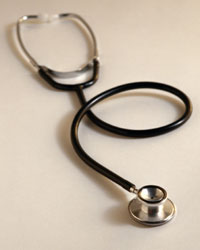|
 Good access to health care is
particularly important for women with disabilities because they often have other
health concerns in addition to their disabilities. Yet women with
disabilities face many barriers to care, often simply because people haven't
thought about the problems they may encounter. Women with disabilities may
not receive regular medical care because of barriers in the physical environment
or the attitudes and perceptions of health-care providers. Good access to health care is
particularly important for women with disabilities because they often have other
health concerns in addition to their disabilities. Yet women with
disabilities face many barriers to care, often simply because people haven't
thought about the problems they may encounter. Women with disabilities may
not receive regular medical care because of barriers in the physical environment
or the attitudes and perceptions of health-care providers.
The Americans with Disabilities Act
requires public buildings to be accessible to people with disabilities, and
health-care facilities are held to a high standard under the Act. ADA
requires medical offices to have
-
Accessible parking, ramps, and rails
for getting in and out of buildings
-
Restrooms large enough for
wheelchairs
Other universal design features not
required by law but more welcoming to women with disabilities include:
-
Lower reception counters to greet
women in wheelchairs
-
Scales that accommodate people who
use wheelchairs or have difficulty standing without support
-
Motorized, adjustable-height
examination tables
Perhaps just as important, medical and
office staff need to have training on basic rules of disability etiquette and
how to best communicate with and assist women with various disabilities. A
few examples:
-
Offer assistance to a person with a
disability if you wish, but wait to see if your offer is accepted and listen
to any instructions about the best way to help. Don't touch a person's
equipment without asking first.
-
Speak directly to a person with a
disability rather than through someone accompanying her.
-
Identify yourself and others who may
be with you when you greet a person with vision impairment.
-
Look directly at a person with
hearing loss and speak slowly, clearly, and expressively.
-
Take time to be sure people with
cognitive disabilities understand you. Use simple words and add
gestures. You may need to write down information or draw a simple picture.
Think About It
Part of CDC's challenge is to raise
awareness about including women with disabilities in research and ensuring they
are a target audience for health promotion activities. A study on heart
disease, for example, might include women with disabilities and document their
incidence of heart conditions so it may be compared with that of women without
disabilities. A public service announcement about breast cancer screening
might include a woman getting a mammogram in a wheelchair. And a brochure
encouraging physical activity could include information on exercise for women
with physical limitations.
Thierry stresses the importance of
working collaboratively with women with disabilities to ensure they are active
participants in all phases of CDC's research projects.
"I don't think people intentionally
exclude women with disabilities from their programs," she said. "They just
don't think about including them."
[Return
to Top]
|